
Wake Forest Magazine asked several faculty and staff how they imbue leadership and character lessons in their work with students. Their answers ranged from examining the Golden Rule across religious traditions to avoiding labeling the Founding Fathers as exemplars of leadership. Excerpts have been edited and condensed for clarity.
(Jump to profile by clicking names)
- Do we grow from adversity? Or just think we’re supposed to?
- Eranda Jayawickreme, associate professor of psychology
- How does the study of religion develop character and leadership?
- Mary Foskett, Kahle professor of religious studies
- Can character be taught through literature?
- Erica Still, associate professor of English
- What can Wikipedia teach about leadership and character?
- Jed Macosko, professor of physics
- How does the business school incorporate leadership & character?
- Patrick Sweeney, professor of the practice of management and executive director of the Center for Leadership and Character
- How can hip-hop influence leadership and character?
- Donovan Livingston, manager for pre-college programs in the Summer Immersion Program
- How can fathers instill leadership and character in their daughters?
- Linda Nielsen, professor of education
- What constitutes player leadership for the football team?
- Dave Clawson, head football coach
- Who exemplifies leadership from the abolitionist movement?
- Anthony S. Parent (P ’09), professor of history
- Which Founding Father exemplifies leadership and character?
- Jake Ruddiman, associate professor of history
Do we grow from adversity – or just think we’re supposed to?
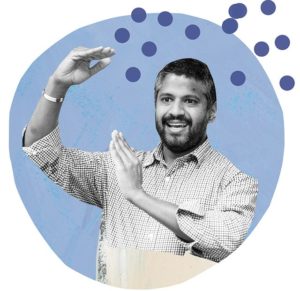
E randa Jayawickreme, associate professor of psychology who received the University’s 2018 Faculty Excellence in Research Award, has studied many aspects of character and personality psychology. One specialty is resilience, or post-trauma growth. He has studied civil war survivors in Sri Lanka, survivors of the Rwanda genocide, low-income residents of Winston-Salem and Wake Forest students.
What is the psychology of how we grow from adversity?
Nietzsche said, “What doesn’t kill me will make me stronger,” a pretty ubiquitous meme. There’s a lot of research on post-traumatic growth. As many as 50 to 80 percent of the people report some kind of benefit (from adversity), and it sounds like people are really resilient.
What I found was when it came to rigorous, well-designed studies, there actually wasn’t a lot there. Overall, we can’t tell, when people tell us they have grown, whether they have changed or whether there’s a cultural narrative around growth. In the United States you have this narrative around redemption — when bad things happen, there’s a good outcome. If you look at different cultures, that connection isn’t always made: “Bad things are bad; why would we expect something good to come out of it?”
We published a paper in Current Directions in Psychological Science giving peer recommendations on ways to research post-traumatic growth in the future.
Why were you drawn to this topic?
I was born in London. I moved when I was 4 years old to Sri Lanka (his family’s home country). The civil war meant that you were always living with the knowledge that the guns could go off. I was interested in understanding what those coping strategies were. (Research shows that) to the degree you feel a sense of self-efficacy, that’s an important predictor (of coping). A powerful predictor of whether you grow in adversity is the social connections you have. A key reason a lot of people (such as military veterans) struggle, they feel like they have no one to talk about or process their problems with.
What has surprised you?
One surprise is the fact that people’s stories don’t seem to be tracking the actual change. Most researchers ask you some questions about how much you think you changed because of the trauma. There are at least two problems with the method. One is that you have to remember who you were in the past. We can do it but not very well. The other problem is we actually don’t know why we change.
We did a study where we tracked Wake Forest students (who) reported a stressful life event. We asked them multiple times a day, “What are you doing right now? How are you thinking?” At the end of the study we asked them how much they thought they had changed. And we compared the actual manifestation of behaviors to their self-perceived change. We looked at five dimensions — appreciating your life, feeling like you could do things with your life, feeling like there are new possibilities in your life, having good quality relationships. And the only dimension where we found a significant relationship was spirituality (the fifth). I might have a narrative about how a bad thing led to a good outcome, but it’s not a reflection of actual character change. It is a reflection of how a positive narrative about adversity can lead to mental health benefits.
We did a study with low-income Winston-Salem residents. We asked people how much they changed, but we also asked other people how much (the subjects) changed. If I said I changed for the worse, (others) picked up on it. The self/other correlation for positive change wasn’t as strong.
How can this research be used?
(A recent study found that) people with resilience were outgoing, seek out social support, are open to new experience, are optimistic. You might want to teach students how to promote skills associated with those dimensions. We can help students and people in the community. We can provide a service to people who at some stage in their life will be going through adversity and suffering.
How does the study of religion help develop character and leadership?
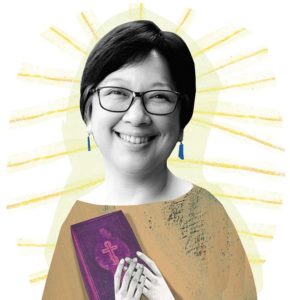 R eligious studies and the humanities can be resources for the study of character, says Mary Foskett, Kahle Professor of Religious Studies and Albritton Fellow in the Department for the Study of Religions. “They are disciplines that ask us to drill down deep to study the presuppositions that underlie particular notions of character.” She helped found Wake Forest’s Humanities Institute nearly a decade ago and served as its first director.
R eligious studies and the humanities can be resources for the study of character, says Mary Foskett, Kahle Professor of Religious Studies and Albritton Fellow in the Department for the Study of Religions. “They are disciplines that ask us to drill down deep to study the presuppositions that underlie particular notions of character.” She helped found Wake Forest’s Humanities Institute nearly a decade ago and served as its first director.
The value of studying religion:
When our students study religion it gives them the opportunity to investigate and compare core values, traditions and practices across a variety of contexts. These components help shape how character is defined and who is served by it. They also bring their own values to the study of religion, which allows them to reflect critically upon those values and ask hard questions about topics that pertain directly to leadership and character, including morality, ethics and justice.
What is character?
Surely the major world religions aspire to shape people of good character. Religious traditions conceive of character in a variety of ways. Whether or not one upholds the ideals of one’s tradition can be seen as a measure of character. There are also, across a range of traditions, what many would identify as variations of the so-called Golden Rule that convey the principle of treating others in the way one wishes to be treated.
What are some examples of leadership in the Bible?
In terms of the New Testament, which is the material that I teach most, two groups stand out to me. One is the disciples of Jesus, who aren’t always portrayed in a positive light. By the time the Gospels were written, the disciples were seen as leaders, but the stories do not back down from depicting their flaws. The second group is the minor, easily overlooked characters who end up serving as role models (the woman suffering from a hemorrhage in Mark 5, the unnamed, good Samaritan in Luke 10, the impoverished and generous widow in Mark 12). Together the Gospels paint a picture that asks us to look closely at, and not just assume, who the real models and leaders are.
And examples of poor leadership?
Greed. Exploitation of the poor and powerless. Corruption and taking bribes. Abdication of responsibility. Betraying the God to whom leaders are called to be faithful as well as the people they are to lead. The prophets are sharp, outspoken critics of unjust leaders.
Who are some modern-day religious leaders in the Christian tradition:
One way in which people lead is through their writing. Writing is often an effort to shape how others perceive reality, think, make meaning or behave. Religious writers in the Christian tradition, for example, can be seen as leaders. Oftentimes, they are concerned about social justice, taking their inspiration from the prophetic tradition. Examples would be someone like (social activist and journalist) Dorothy Day or (civil rights leader and theologian) Howard Thurman or (theologian and writer) Dietrich Bonhoeffer or Martin Luther King Jr.
Can character be taught through literature?
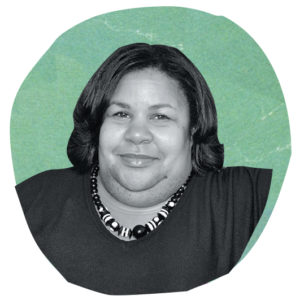 T he answer is yes, according to Erica Still, associate professor of English and associate dean for faculty recruitment, diversity and inclusion. To that end, she uses “Dreamer: A Novel” by Charles Johnson about a protagonist hired to be the double of the Rev. Martin Luther King Jr. While the double looks like King, Still says he doesn’t embody the character attributed to King. The novel enables Still to have generative discussions with students about what it means to be a person of character. Her latest project is researching what leadership looks like in contemporary African American fiction.
T he answer is yes, according to Erica Still, associate professor of English and associate dean for faculty recruitment, diversity and inclusion. To that end, she uses “Dreamer: A Novel” by Charles Johnson about a protagonist hired to be the double of the Rev. Martin Luther King Jr. While the double looks like King, Still says he doesn’t embody the character attributed to King. The novel enables Still to have generative discussions with students about what it means to be a person of character. Her latest project is researching what leadership looks like in contemporary African American fiction.
Hospitality: One of the things that I think literature is most able to do is it invites us to practice a certain kind of hospitality that I think is an important part of character that we don’t always acknowledge. If I sit down and start reading a novel, I have to give myself over to the story, to those characters. I have to accept it on its own terms, and I have to let it take up my time and attention. If I can practice that with novels, I can practice in my interactions with people.
Leadership: As a leader, if I understand the person that I’m working to advocate for or lead in some way — if I’m open to their story, I understand where they’re coming from, I understand what they need, (and) I’m much better positioned to respond in ways that are meaningful and relevant to them. … It’s one of the main ways that I think we can develop the kind of character that allows us to build community and allows us to act with integrity.
Self-awareness: I think a lot about wanting students to develop … the ability to be reflective, and so I think about that as a character trait in terms of a certain degree of self-awareness, a certain degree of curiosity, that willingness to step back … and observe themselves and to think: “What’s the impact of how I’m acting in a particular context?”
Building character through reading novels:
I was thinking about things like experience, empathy — where you’re actually trying to give yourself over to another person’s emotional experience (through reading a novel) — but also sometimes it’s sympathy, where you are expressing concern for someone else but not necessarily deeply identifying with them. … Sometimes we are so immersed in a story that we feel what the characters are feeling. Sometimes we’re not immersed, but we care enough that we’re sympathetic to the characters. I think that has a lot to do with character, with the ability to see someone else’s experience, to take it on, or to at least feel a certain degree of compassion.
A book that changed her:
Toni Morrison’s “Beloved.” I hated that book when I first tried to read it. But I had to read it for a class (as an undergraduate). … There was a point at which it just clicked, and I realized what was happening in the novel. And at that point I was able to say, “This is pretty amazing.” … I think about it in terms of character in relationship to the way that working with and wrestling with (a) novel develops those traits of patience and persistence and openness. … Because I had to stick with it, I had to practice those things.
What can Wikipedia teach us about character and leadership?

P rofessor of Physics Jed Macosko has students in his first-year seminar study “The World’s Most Influential People: Using Semi-Big Data to Decide the Origins of Influence.” Macokso, a biophysicist with a Ph.D. in chemistry, researches the mechanical properties of cancer. He also has created interactive online biology, physics and chemistry textbooks. That led to a partnership with a team of academics and data scientists to create AcademicInfluence.com, which uses big data to rank the most influential people, places and institutions. That’s how, he says, “a professor of physics became a researcher in Wikipedia and influence.”
Can you use big data to identify leaders?
Big data will tell you who’s most influential. There are different ways to do it, but we use Wikipedia as our big data set. For example, if there’s a page on Wikipedia on WikiLeaks, the word (Julian) “Assange” shows up a certain number of times, as does “computer programming” and “computer science.” You multiply the number of times a person’s name appears on a page and the number of times a certain academic field appears on a page … and that becomes your influence score. So, Julian Assange has some influence, in the top 200 influencers, in the field of computer science and computer programming.
Does influence translate into leadership?
Once you’re an influencer, you’re a leader. Julian Assange leads because people look to see what he’s doing. He has set up a system where anybody can anonymously post videos, documents or things like that. You may say, “That’s a good idea: I’ll do the same thing.” And in that sense, you’re following his lead. He’s leading you to help you achieve something. He’s influential but in a potentially negative way.
Can big data show you which leaders have character?
My students picked up on character as they researched influencers. What they realized is that part of character might be taking risks that lead to positive rewards for other people. Students saw that, especially in the more entrepreneurial influencers. Mother Teresa was one. You could call her an entrepreneur because she started a huge organization in Kolkata (formerly Calcutta). It was not one that produced financial reward for herself, but one that produced benefit and value to the people she was working with. (She showed) the leadership qualities of being willing to take a risk, being willing to fail, not being afraid.
Who is your pick for exemplifying leadership and character?
I would say Mother Teresa because I subscribe to her view of the poor being God’s creation and an opportunity to really connect with God by helping the poor. Of all the leaders that were presented (in class), I’d like to have dinner with her.
How does the business school incorporate leadership and character?
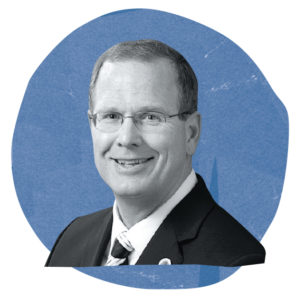
P atrick Sweeney, a retired U.S. Army colonel, is executive director of the Center for Leadership and Character in the School of Business. Sweeney, a professor of the practice of management, has a Ph.D. and master’s degree in social psychology from the University of North Carolina at Chapel Hill, a master’s in military art and science from the United States Army Command and General Staff College and a bachelor’s in engineering from the U.S. Military Academy at West Point. Among his many experiences, Sweeney delayed his graduate studies at the request of Gen. David Petraeus to assist in Iraq in 2003. While serving, he studied combat leadership and trust.
The business school’s mission is to develop leaders of character who get results with integrity. You cannot separate ethics and character from being a leader, so that’s the basic premise that we operate on. The school has a developmental framework, and there are three pillars.
The first is conceptual knowledge, what they learn in the classroom. The next is practical competence. Can they apply what they learned in the classroom in a real-world setting? Most will have internships, and we do case studies. And the last one, which my center is responsible for, is the character domain, or the honorable domain. The mission is to infuse leadership, character, ethics into everything the school does, and that includes the curriculum.
How do students work on their leadership and character?
The foundation is self-awareness. We’ve created three proprietary 360 assessments (by themselves and peers). We ask them to find their values. Not what your parents gave you. What’s going to be your values? What is your purpose? Where do you find fulfillment or significance?
And we get them to think about their legacy. What do you want people to say about you when you retire or on your 98th birthday? Then we say, “Now you’ve got to develop a vision and a plan to get there.” Most courses will ask them to write their leadership philosophy. We view everybody as leaders. Doing the right thing, being positive, helping colleagues — you’re leading. The absolute key is consistent periodic reflection. Get up in the morning, set your intentions. And reflect on your day. What went well? What can I do better tomorrow? It seems simple, but it’s really powerful.
Leadership advice is so prevalent today. What about character?
The essence of leadership is character, and it really comes down to trust. Develop a support system to get candid feedback. Align your friends with your value system. Have a job that fits your values and beliefs. Don’t just chase the paycheck.
What did you learn about leadership from the military and from your experiences in Iraq?
It is infused into you at West Point — duty, honor, country. And the military’s leadership philosophy is values-based and a servant leadership model. (In Iraq) they have the rules of engagement to apply a lethal force. A lucrative target shows up on the battlefield, and you had to have physical eyes on the target. There was a sandstorm, and people could hear but they could not positively identify that these were Iraqi military vehicles. So the commander let the vehicles go. You wait until the criteria are met. That sets up very clear boundaries.
How does that work in the business world?
(In a friend’s company) if they make a tough call, they have it posted in their conference room, and they run it down their credo. If it aligns with their credo, then it’s the right thing to do. That’s their rules of engagement for business. We put students in situations we call ethical friction points, like an analyst, somebody wants to misinterpret your data. We call it gaming or contingency planning — think through it, so they have a playbook if they’re ever in that situation.
How can hip-hop influence leadership?

D onovan Livingston is program manager for Pre-College Programs in the University’s Summer Immersion Program, preparing high school students for college. He is a spoken word poet and hip-hop artist who delivered a nationally acclaimed 2016 convocation speech to his Harvard Graduate School of Education class that went viral on YouTube. (LINK)
He has a bachelor’s degree from the UNC Chapel Hill and master’s degrees from Harvard and Columbia universities. He has worked as a college adviser and is working on his doctoral thesis at the UNC at Greensboro on how hip-hop artists’ college experiences influence them.
How have college advising and your artistic and musical work intersected?
Even in college, hip-hop was my thing, and then in my first job (college advising at two Title I high schools in Greensboro, North Carolina) I was writing a bunch. I would rap with my students. I was adviser for a poetry club. I think allowing students to see that part of myself really helped them see that “Oh, I can go on to college and still retain those things that make me feel like a whole person.”
How does hip-hop create avenues for leadership?
Hip-hop is predicated on four core elements: DJ-ing, emceeing, like rappers or lyricists, break-dancing and graffiti. So you have these multi-modalities (of learning styles). It offers an opportunity for leaders, especially within education, to engage those different modalities, to get the most out of the students. Hip-hop was born out of a set of social conditions in the mid- to late 1970s that required people to speak truth to power. I want students to understand that we can express joy through the music; we could also express the injustices. I think hip-hop is well-suited for pointing out the flaws in our various systems that govern our society, and they do so over a really dope beat.
How does this fit into higher education?
(Many of my favorite hip-hop artists) are college-educated. Higher education and hip-hop are inextricably linked — that coming of age and learning things about yourself and the world, in association with learning how to deconstruct the world, I think those pair beautifully.
How do you continue your creative expression while working full-time and pursing a doctorate?
I do this thing called #ThursdayVerseDay on Instagram, where I ask people, “What beat should I rap to this week?” and I write at least one 16-bar, 16-line verse. I’m always on stage somewhere. Even if I get invited to do a lecture or talk, there will be poetry or rap within my remarks.
How can we look to artists as leaders?
When you talk about leadership and character, character is that thing that inspires you to go beyond your set of duties. It’s something that acts as a lighthouse, a guiding light that keeps you on pace to those things that you hold true. Students need to see that manifested in leadership within schools.
We ask of leaders to be courageous, to be open-minded, to be creative. I think artists are adept at identifying ways in which humans can be better. It takes courage to perform in front of people, to make it accessible in such a way that we hope it touches someone’s heart. Modeling vulnerability is something everyone can learn from artists. Hip-hop artists, I think, are a very understudied, underexplored population in college contexts.
I appreciate the University taking the lead and trying to be mindful about what it means to have good character. I hope that in discussing character we hold up a mirror to ourselves and expect from us what we expect from our students.
How can fathers instill leadership and character in their daughters?

P rofessor of Education Linda Nielsen has studied father-daughter relationships for more than 25 years and teaches the only known college class in the United States devoted exclusively to father-daughter relationships. Her research has influenced two national advertising campaigns: Mattel’s 2017 “You Can Be Anything” campaign, which features dads and their daughters playing with Barbies, and Pantene’s 2016 Super Bowl ads, which show several NFL players giving their daughters “dad do’s.” She is the author of several books including “Father-Daughter Relationships: Contemporary Research and Issues” and “Between Fathers and Daughters: Enriching and Rebuilding Your Adult Relationship.”
Do fathers have more influence on their daughters than mothers?
Fathers have more impact in certain areas of their daughter’s life. The two biggest things dads have more influence over are men and money. Dads also usually have more influence in their daughter’s academic achievements and career choices. He influences whether or not she’s going to pursue those activities in school and pursue careers that require more leadership skills. For example, fathers are more likely (than mothers) to push their daughters to pursue jobs in STEM (science, technology, engineering and mathematics).
A dad also has more influence in building certain character traits. Does he encourage her to be assertive? Outspoken? Unafraid of defending an unpopular opinion? Self-confidence is part of character and leadership. That gives a daughter the courage to stand up and say, “No, we’re not doing that,” or “No, I disagree with that.”
What can fathers do to teach leadership and character to their daughters?
No. 1, don’t treat her like daddy’s girl and a little princess. What image do those terms conjure up in terms of character and leadership? A little princess is not going to be a CEO or an entrepreneur. A little princess is going to sit back and wait for her Prince Charming to come along to pamper and rescue her. A dad helps his daughter grow a backbone, not a wishbone. That means she’s going to speak up when no one else has the nerve. To be a leader and to have character, you can’t worry too much about what other people think about you. Forget about being popular or always pandering to your boss for approval.
What are some of the stereotypes that your research refutes?
Character and leadership have nothing to do with gender. The research on empathy, compassion, understanding and communication shows us there are no gender differences. Just because you’re female doesn’t mean you’re going to be a more empathic or communicative leader. Character is not gender coded. Character is learned and acquired. Are you able to communicate well and build consensus? Are you able to bring people who disagree with one another together? Those are learned skills, and it’s typically the father who teaches those things. In society today, boys get the message to be assertive, be outspoken, be a leader. They’re going to get that message even if mom and dad don’t teach it. For girls, fathers are key to learning leadership skills and building character.
Tell us about a class assignment that helps a daughter know her father better.
One of the assignments that students have is to interview their dad. Ask him about the mistakes that he’s made. Ask him about the things he regrets. Ask him about things he wished he’d known when he was your age. The goal is to see that their dad is not perfect. If she sees that, she’s going to be more willing to go to her dad for advice. She also learns from her dad that people can be of good character and be leaders without being perfect.
What constitutes leadership for the football team?
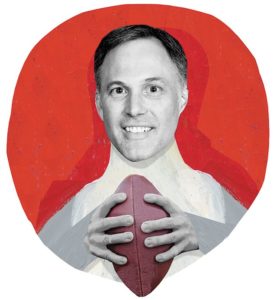
W hen head football Coach Dave Clawson arrived at Wake Forest in 2013, he brought with him a strategic commitment to develop player leadership. “One of the attributes of a successful team and a successful program is a team that has (player) leadership,” he says. “That is such a factor, why leave it to chance?” Every year, the team elects 14 or 15 players to serve on a leadership committee that meets regularly with Clawson. “The way I look at it, we have a quarterbacks’ coach, a defensive back coach, a defensive line coach; this becomes my group.”
What do you expect from your leadership committee?
I use different books and articles and different concepts of leadership with them. The emphasis is that leadership has to be proactive. There’s no such thing as leadership by example. One of the expectations is that they do something (every week) to exhibit proactive leadership. What did you do last week? They know that question is coming, so they know they need to do something. It might be as simple as grabbing a younger kid on the team and taking him to lunch. Or you go watch extra film and bring your backup with you. A lot of times players think that the leader is the guy who before the game gives a rousing speech. Leadership is influencing one person in a positive way. And a lot of times that involves leaving your comfort zone.
Can you talk about your collaboration with Patrick Sweeney (executive director of the School of Business’ Center for Leadership and Character)?
We’ve talked about concepts of leadership. He’s worked with our staff; he’s worked with our team on things like conflict resolution and how to influence people. We try to get a feel for who the emerging leaders on the team are, the 10-15 players I predict will be in our leadership group, and I encourage them to take his class (Foundations of Tactical Leadership, taught in cooperation with ROTC).
How do you build character on the team?
This word gets overused, but it’s more important to me that we have a championship culture than a championship team. I think if our culture is healthy, then we have a chance to win a lot of games. If our culture is bad — if we find out some kids aren’t going to class — that, to me, is an indicator of bigger problems.
It starts with recruiting. There are four musts that a young man must have if we’re going to recruit him. He must have the ability to play in the ACC, he must love the game of football, and he must understand the academic rigor of Wake Forest. And the fourth must, and this might be the most important one, we want to recruit high-character kids. Wake Forest is such a small school that bad-character guys stick out. Any mistake you make is going to be amplified. It’s hard to hide here, academically, socially, work-ethic-wise. I think we end up with good leaders and hard workers and overachievers because that’s very much our guiding principle.
What makes a good leader?
Leaders need to have vision. They have to articulate the vision and document the steps and the path to the vision. Everything we do in our program, all the things that we measure, are all with the goal of getting our program to that vision point that we constantly talk about. It’s not just wins and losses. There are other measurables that tell you if you’re on the path. It’s making sure that the guys graduate and maximize their potential academically, and that we’re giving them exposure to leadership and career opportunities. At the end of the day, it’s very important that we add value to their lives.
Which person best exemplifies leadership from the abolitionist movement?
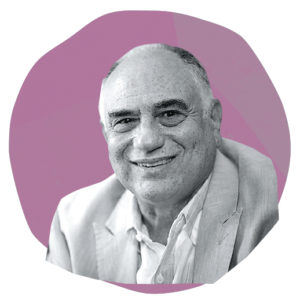
F rederick Douglass is the best example, says Professor Anthony S. Parent (P ’09), who teaches American, African and world history. Douglass, a former slave who escaped from Maryland to New York in 1838, became a prominent speaker and writer against slavery. Parent is finishing two research projects, “Scandalous Paradox: Transformation of a Slave Society in Virginia” and “Slave Rebellion: Myth, Memory and Possibility.”
How did you become interested in Frederick Douglass?
I entered college in 1969. That was, of course, when civil rights were coming along. It was also the era of Black Nationalism, the Black Panther Party, Martin (Luther King Jr.) and Malcolm (X); it was a turbulent time. African Americans were largely absent from the texts. Students were agitating for African American history. Professors were scrambling to find texts, and Douglass was a natural. We had an idea of who Douglass was and what he looked like — the big hair — but there was no context to (his role in) the development of the country.
Why was Douglass important to the abolitionist movement?
He was born a slave, so he uses his life story to drive a wedge into slavery. He was in many ways the prototype for the slave narrative, describing the anguish of enslavement and the dangerous escape to freedom. He brings attention to what it meant to be a slave. People would listen to those stories and be moved. He starts a newspaper, The North Star, later the Frederick Douglass’ Paper. He becomes a prominent speaker for the slave’s cause. He advocates not only for the abolition of slavery, but also for equal rights, citizenship rights, for blacks. He’s giving voice to the African Americans themselves.
(When the Civil War starts) he pushes for the participation of blacks in the military. He understood that they could help destroy slavery and at the same time assert their citizenship rights. When the war ends and the suffrage question comes up, there’s no question that he supports women’s suffrage. But he also believed — and this is his practical side coming out — let’s achieve what we can at this moment and at least give African American males the right to vote.
What were some of his personal qualities that made him a leader?
He was a large man; he asserts that physical presence on the stage when he was giving talks about his childhood and life as a slave. Yes, others had a background like his. Maybe if he hadn’t had that presence, we wouldn’t know him as well as we do; maybe his would be just another slave narrative.
He had a great sense of humor; we often think of leaders as being self-deprecating. But at the same time, he was also a very proud man. He had a flair for language. He saw himself as a political personality. At first, he believed in moral suasion. “We’re going to persuade people that this (slavery) is evil.” He also had a pragmatic approach to finding political allies, even if they didn’t share all his views (about citizenship and equal rights). He debated (those abolitionists who advocated violence), but after the passage of the Fugitive Slave Act (1850), he advocated self-defense.
Which of the Founding Fathers best exemplifies leadership and character?

T hat is not the right question to pose to Jake Ruddiman, associate professor of history and author of “Becoming Men of Some Consequence: Youth and Military Service in the Revolutionary War.” A great figure in history didn’t draw him to the study of history. He became a historian, he says, because “I love stories, and I love sources.” He focused his scholarship on the American Revolution “for the same reason you go fishing in a really hot spot — because that’s where the fish are. The Revolution — that’s where the sources are. The archive is rich with ordinary voices. … ‘Grandpa, tell us what you did in the war. Tell us what you did in the Revolution.’ That man never asked his grandfather, ‘Granddad, tell me what you did in the 1730s,’ because no one cared.”
How do you teach leadership and character through history class?
Am I trying to teach leadership and character? No. I’m trying to teach students how to understand the firehose of mendacity and lies spewed at them by interested parties, because you cannot read sources from the past and understand them without understanding the perspective, the bias, the intent, the accidents, the self-deception. In my intro courses you can say, “Oh, this source is biased,” and my response is, “Wonderful. Great. Give me the source where they’re lying.” OK, now we’ve got to figure out why they’re lying, to whom are they lying. That’s what I want to do in my classroom. …
I’m not telling students how to vote. I’m trying to help students develop the tools that they need to figure it out themselves. Because ultimately American democracy rests on the premise that a majority of people, if given a long enough runway of time, will eventually make the right choices and can determine their own self-interest and collective national interests. And if you do not believe that, you’re a fascist. And one of the things that American history shows us is the American people make bad choices, but they also make good ones.
The problem with regarding the Founders as exemplars of leadership:
If we elevate them above us, then we let ourselves off the hook. A historian whom I admire very much and taught me immensely, Joanne Freeman, (wrote) in her first book, “Affairs of Honor: National Politics in the New Republic”: “If the founding generation were a band of angels, American politics has been in a state of free-fall ever since; if they were little more than greedy power-mongers, there is little hope that America can rise to much more. However, as real people who struggled with a difficult task, sometimes inspired to high purpose, other times feeding their meanest appetites, they extend to posterity the gift of hope. If these fallible, flawed people could accomplish great things, perhaps future generations can do so as well.” I like that a lot. Because the problem with the Founding Fathers is that they’re wrong about so many things, and politics is a technology, and political philosophy is a technology. It gets better as time goes on.
Why is studying history valuable?
Ultimately what studying history shows us is it pushes us to feel. If you feel empathy for people in the past — in the mistakes that they made, in the things that they could not see, in the wrongs that they did — thinking all the way through to the present, it makes you realize that there’s something that I do not see right now. There’s something that I’m going to be judged for by my descendants in 200 years. … It doesn’t mean that things are always getting better. But if I stand in judgment of the past, I can only do that if I am willing to accept that someone is going to stand in judgment of me and my generation.


